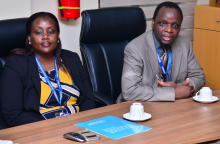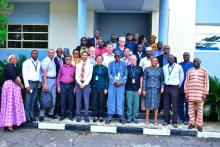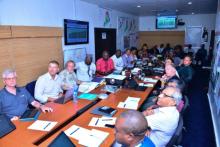External team begins assessment of surveillance system in Nigeria.
Abuja, 16 August, 2016 - An external surveillance team is in Nigeria to assess the sensitivity of the acute flaccid paralysis (AFP) surveillance system. The assessment team will work at the national level and selected states of Borno, Kaduna, Kano and Sokoto from 15 to 25 August, 2016. The team further intends to determine the potential source or reservoir of the recently detected wild polio viruses in Nigeria.
The gold standard for polio surveillance in the Global Polio Eradication Initiative (GPEI) is the detection of cases of AFP and laboratory testing of stool specimens in a WHO accredited laboratory.
Welcoming the team to the World Health Organization (WHO) office in Abuja on 15 August, 2016, the acting country Representative, Dr Rex Mpazanje acknowledged the crucial role that the assessment will play in further improving surveillance performance in the country.
Dr Mpazanje strongly requested the team to examine surveillance activities not only within the technical parameters but also take into cognizance the contextual situation. In that regard, he suggested that the team assists the programme in Nigeria to recommend strategies for strengthening surveillance in highly inaccessible areas.
While in Nigeria, the team will also assess if all the components of surveillance of priority diseases, particularly AFP, Measles, neo natal tetanus, Yellow fever and other vaccine preventable diseases function efficiently and effectively, within the framework of Integrated Disease Surveillance and Response (IDSR).
At the National Polio Emergency Center (EOC) where the team was updated on the progress, residual challenges and priorities of the polio eradication initiative in Nigeria, Dr Usman Adamu, the Incident Manager, mentioned that the recent detection of cases in Gwoza and Jere LGAs of Borno state was a major setback and will require the review of the initial objectives of the external review.
He assured the external team that even though the national programme is currently over-stretched with supporting the oubreak response in Borno, yet the local surveillance team is capable of handling the external review which will determine whether human, financial and material resources provided for AFP surveillance as well as opportunities provided by AFP surveillance are used to support IDSR implementation.
Additionally, the team will review whether surveillance data are sufficiently completed, analyzed and used to monitor and guide disease control programme activities.
At both the national and different locations in the states, the team will assess the knowledge and preparedness of key personnel for detection, investigation and reporting of AFP and other diseases under International Health Regulations.
Members of the external review team are drawn from WHO, United Nations Children Fund, Centers for Disease for Control and Prevention and Bill & Melinda Gates Foundation.
The preliminary findings and recommendations from the field visits will be presented to the Minister of Health and EOC members on 26 August, 2016 for further action.
_____________________________________________________
For more information, please contact:
Technical contacts:
Dr Fiona Braka; Tel: +234 703 170 5252; Email: brakaf [at] who.int
Dr Ticha Johnson; Tel: +234 816 347 5205; Email: tichaj [at] who.int
Media contact:
Ms Charity Warigon; Tel: +234 810 221 0093; Email: warigonc [at] who.int
Below:
01. Briefing at EOC
02. Dr Mpazanje (right) welcoming the team to WCO while WHO EPI Team Leader, Dr Fiona Braka looks on
03. Group photograph of external review team with EOC IM (middle) and partners






